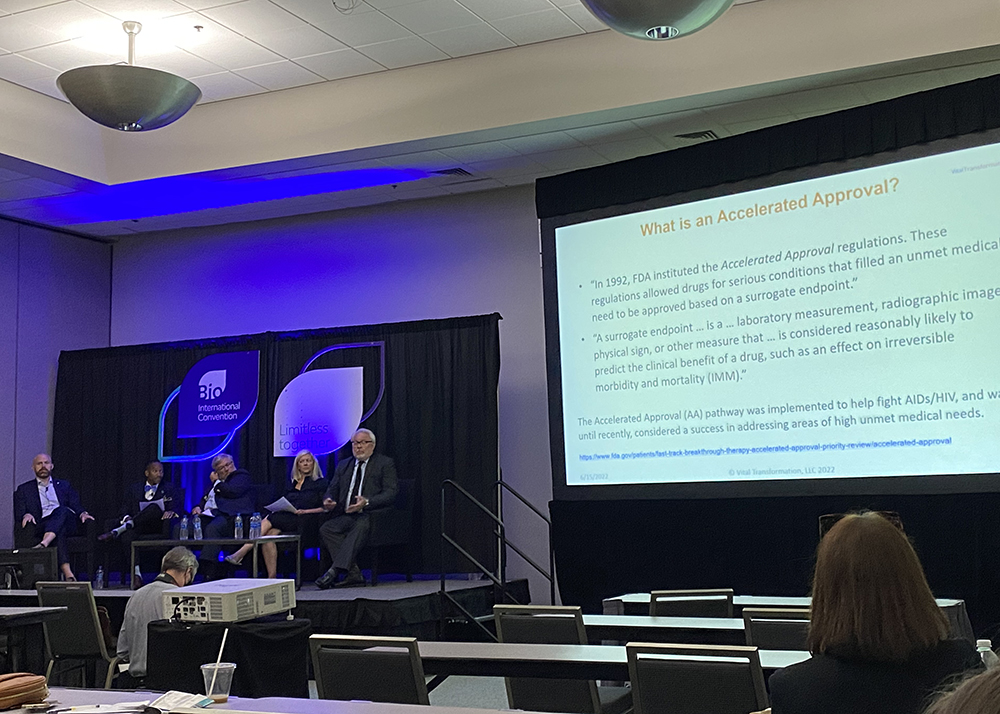If new restrictions are placed on the FDA’s Accelerated Approval pathway, a program to speed market access for drugs addressing serious conditions, as many as two thirds of the treatments that use this pathway would never reach patients, according to research released today at the BIO International Convention.
The report, “Calculating the Value and Impact of Accelerated Approvals,” was presented by Duane Schulthess, CEO of Vital Transformation, the firm that prepared the research, in a panel led by John Murphy, Chief Policy Officer of BIO. The panelists included patient advocates who explained why Accelerated Approval is so important to the patients they serve.
FDA’s Accelerated Approval was established in the 1990s as a way to encourage development of new drugs to fight AIDS/HIV, Schulthess explained. The program is intended for drugs that treat serious conditions for which no effective treatments exist, and it allows a drugmaker to gain approval based on achieving a surrogate endpoint—a biomarker assumed to indicate efficacy as opposed to a proven cure. Recipients of accelerated approval are still ultimately required to prove clinical benefit, but they can enter the market before this is confirmed.
The majority of drugs taking advantage of the Accelerated Approval pathway are for cancer, and 82% are for so-called orphan conditions, diseases that effect fewer than 200,000 people and therefore are commercially challenging to address, Schulthess said. The program has led to the development of a number of important drugs, and “until a few months ago it was considered a huge success,” he said.
Investigating criticism of Accelerated Approval
“There is growing sentiment from some payers, academics, and state and federal policymakers that the pathway needs to be significantly altered or restrictions applied to drugs approved through the Accelerated Approval pathway,” according to a summary of the report.
The report was an unbiased, data-based and market-oriented investigation of these claims, designed to uncover the reality of situation, Schulthess said. He explained the workings of the detailed analysis, which focused on the impact that changes to Accelerated Approval would have on net present value (NPV) of therapies, a key decision point for drugmakers who must decide whether they have a chance of recouping their investment after yeas of development. He said the report’s conclusions refute the criticism and underline the risks of changing regulations and slowing the timeline of the FDA’s Accelerated Approval pathway.
“We estimate that 33% to 66% of accelerated approvals at the median delay of three years will no longer have a net positive NPV, and would be at high-risk of not coming to market or being developed at all,” the report finds. “We estimate these at-risk therapies address the needs of 850,000 to 3.6 million patients, depending upon our cost assumptions and estimated delay time.”
Offering hope
After the presentation showed why Accelerated Approval is so important, the panelists discussed the real risks the pathway faces, including the recent decision by the Centers for Medicare and Medicaid Services (CMS) to severely limit Medicare coverage for an Alzheimers drug that received FDA approval through the pathway.
John Dwyer, President of the Global Alzheimer’s Platform Foundation, said that changes being considered to the Accelerated Approval pathway as part of FDA user fee legislation, are “not perfect” but “it could have been a lot worse.” He said the real threat to the pathway is coming from the CMS.
“CMS just changed everything,” according to Dwyer. “The nuclear winter Duane showed you is really possible thanks to the CMS.” He maintained that investment in new drugs would dry up due to the uncertainty introduced by the CMS, which has suddenly decided it can undo decisions by the FDA.
Carolyn Hickey Executive Director of Government Affairs & Policy at Sarepta Therapeutics, said her company, which develops drugs for the rare disease Duchenne syndrome, has had payers refuse to cover drugs that used the accelerated approval pathway, thereby denying patients access to those drugs. She maintained that these decisions are made by people who are not qualified to understand the process or question FDA’s approvals.
Quardricos Driskell Vice President of Public Policy & Government Affairs Autoimmune Association said patients desperately need the drugs the pathway is supporting. “For our community, the Accelerated Approval pathway offers hope,” he said.




